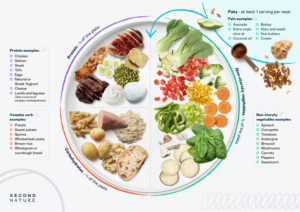Jump to: Are eggs good for you? | Eggs are a rich source of protein | Eggs are very nutrient-dense | Eggs can help with weight loss | Take home message
Eggs aren’t bad for you; they’re an excellent addition to any diet that’s based on whole foods.
They’re also a rich source of vitamin A, iodine, and selenium, and their high protein and fat content will help you feel fuller and more satisfied until your next meal.
This doesn’t mean you should eat 10 eggs every day; any excess food will mean that other mutually beneficial foods will be left out; potentially increasing your risk of certain deficiencies in other essential nutrients and vitamins.
However, as part of a balanced diet based on whole foods and minimises the consumption of ultra-processed foods, eggs are an excellent addition to any healthy eating pattern to support good health.
Eggs haven’t always been viewed as a healthy food. The fear that the dietary cholesterol and saturated fat in egg yolk would raise your blood cholesterol levels (particularly the so-called ‘bad’ LDL cholesterol) and increase your risk of cardiovascular disease and experience a heart attack has meant they’ve had a bit of a bad reputation.
We now know that the cholesterol within eggs has a minimal effect on the body’s LDL cholesterol levels.
Organisations such as the American Heart Association put limits on dietary cholesterol (aiming to keep milligrams of cholesterol below 300 per day) with a specific focus on reducing egg consumption.
However, we now know that the cholesterol content you consume in a healthy diet has minimal impact on blood cholesterol levels.
Click here to learn more about the connection between dietary cholesterol from eggs and blood cholesterol levels.
Fortunately, dietary guidelines have recently caught up with the science, and the previous daily limit recommended for egg consumption has been removed.
If you follow a vegan diet – you’d need to source protein, fat, and other essential nutrients like vitamin A from other sources.
Click here to find some great recipes with eggs on the Second Nature website.

At Second Nature, we don’t ban or label foods as good or bad. We believe all foods can be included as part of a healthy balanced lifestyle, and eggs are no exception.
If you’d like the support of a registered dietitian and join people like Jo who’ve found food freedom and achieved their health goals without counting points or syns, click here to take our health quiz.
Otherwise, keep reading as we look at three reasons eggs are good for you and should be included in a balanced diet.
Medication-assisted weight loss with a future focus
Start with Wegovy or Mounjaro, transition to habit-based health with our support


1) Egg whites are a rich source of protein
Protein is an essential nutrient responsible for the growth and development of our body’s cells and tissues. Various proteins are also essential for other bodily functions, such as cellular messaging and our immune function.
It’s estimated that we should be consuming around 1.2g of protein per kilogram of body weight per day to maximise the body’s requirements for growth, maintenance, and other essential functions.
For an individual weighing 80kg, this would equate to around 96kg per day – or 32g in each meal.
With 12.4g of protein per 100g, eggs are a rich source of protein. Four medium eggs would provide you with around 24g of protein, or 25% of your daily protein requirements if you weighed 80kg.
When we’re looking to maximise protein intake, it’s about the total amount and the balance of different amino acids (AAs).
Each protein will be a combination of many different AAs, and this balance will determine how well it’s digested and absorbed by the body’s cells.
There are also nine essential amino acids the body can’t produce, which we must obtain from the diet.
Eggs have been rated as a high-quality protein source using various assessment methods for digestibility and absorption. They provide your body with all the essential amino acids and are very effective at stimulating the growth and maintenance of the body’s cells.
Key points:
- Protein is an essential nutrient, and it’s estimated we should be consuming around 1.2g of protein per kilogram of body weight per day.
- Eggs are a rich source of protein, with 12.4g of protein per 100g.
- Eggs are also rated as a high-quality protein source as they contain all the essential amino acids and are digested very well.
2) Eggs are very nutrient-dense
Eggs are incredibly nutrient-dense. They’re a source of magnesium, vitamin D, vitamin B12, iron, calcium, phosphorus, and zinc, all essential for our health.
However, we’ll focus on four vitamins, minerals, and nutrients particularly rich in eggs: choline, vitamin A, iodine, and selenium.
Choline
Choline is an essential nutrient required to ensure the structural integrity of many cells in the body. Choline is also required to produce a neurotransmitter that helps to boost mood, memory, muscle control, and other nervous system functions.
We can make some choline in the liver, but typically not in sufficient amounts for our needs. One large egg contains around 147mg of choline, which is around 27% of the recommended daily intake.
Vitamin A
Vitamin A, or retinol, is an essential fat-soluble vitamin required for many essential bodily functions, including vision, immune function, and surface tissue such as the skin.
Whilst rare in Western countries, vitamin A deficiency can lead to an increased risk of infection and contribute to the development of blindness.
Eggs contain around 180 micrograms of vitamin A per 100g (two medium eggs), providing 25% of your minimum daily requirements for a man and 30% for a woman.
Retinol, the form of vitamin A found in eggs, is the active form and is more readily digested and utilised by the body for its essential functions.
Carotenoids, the form of vitamin A found in fruits and vegetables, are known as a ‘pre-vitamin’ and need to be converted to retinol in the liver before the body can use them. However, conversion rates are only between 10-20%.
Iodine
Iodine is a trace element, as we only need it in very small amounts. It’s an essential component of our thyroid hormone testosterone (which comes in two forms, T3 and T4).
Testosterone is essential in managing our metabolism and ensuring adequate protein utilisation in cells and tissues.
Iodine deficiency, again rare in Western cultures (particularly after the introduction of iodised salt), can lead to a condition known as goitre, which is an enlargement of the thyroid gland and can negatively affect mental function; it also increases the risk of developing thyroid cancer.
Eggs contain around 49 micrograms of iodine per 100g (two medium eggs), providing nearly 33% of your minimum daily requirement for iodine.
Selenium
Selenium is an essential trace element required for reproduction, thyroid hormone metabolism, and immune function.
Selenium deficiency can lead to infertility in males, iodine deficiency, and an increased risk of developing Keshan disease (a chronic heart condition).
Eggs contain 31 micrograms of selenium per 100g (two medium eggs), providing 56% of your minimum daily requirement for selenium.
If you’re a vegan, it’s worth seeing whether any egg substitutes you consume contain nutrients to whole eggs.
Key points:
- Eggs are incredibly nutrient-dense and are rich in many essential vitamins that help the body function properly.
- In particular, eggs are a very rich source of vitamin A, iodine, and selenium which all have essential bodily functions.
3) Eggs can help with weight loss
As we’ve previously discussed, lower-carb diets rich in protein and higher in fat from whole foods are more effective at supporting weight loss for people living with obesity in the long term compared to low-fat diets.
Considering eggs are a rich source of fat and protein, they can be a valuable addition to your diet if you want to lose weight; research appears to support this.
A study randomised 70 participants to eat either 0, 1, or 2 eggs daily at breakfast for eleven weeks. The study found that those consuming more eggs significantly reduced their hunger and increased their meal satisfaction.
The results also showed a significant decrease in the hunger hormone, which we call ghrelin, compared to those consuming no eggs.
Interestingly, there was no difference in weight loss between the groups after 11 weeks, but other research suggests eggs can support weight loss.
A study investigated the impact of two diets on weight loss. The first group was instructed to eat eggs for breakfast, while the second group was instructed to eat bagels.
The diets were designed to be matched for total energy intake, with the only difference being the breakfasts.
After 8 weeks, the egg group lost an average of 2.63kg compared to 1.59kg in the bagel group. The egg group also achieved a 34% greater reduction in waist circumference and a 16% greater reduction in total body fat.
Similarly, diets higher in eggs and total protein and lower in carbohydrates may help to maintain lean mass while supporting weight loss compared to diets lower in protein.
Lean mass comprises our muscles, bones, and vital organs – and reductions in lean mass are typically not a good thing.
A study compared a high protein, high egg diet to a lower protein diet without eggs on weight loss and lean mass retention.
Both groups lost the same amount of total weight, averaging 3.3kg. However, only the egg group maintained their lean mass after 12 weeks.
This suggests that eggs can help support weight loss and help maintain lean mass during a weight loss journey to ensure that most weight is excess body fat.
Research has also shown that higher egg intake can support individuals with type 2 diabetes to enjoy a heart-healthy diet and improve risk factors for heart disease, such as blood pressure, despite the higher cholesterol intake.
Key points:
- Eggs are rich in protein and fat, and diets rich in protein and fats from whole foods have been shown to support weight loss.
- Clinical trials have shown that eggs can support weight loss to a greater extent than lower protein diets that don’t contain eggs.
- Due to their protein content, eggs can also support lean mass retention, which is often reduced during weight loss.
Take home message
Eggs are a perfect example of how we can be too black-and-white and oversimplistic in our approach to food and nutrition.
It was previously believed that cholesterol caused heart disease, and because eggs contain dietary cholesterol, they must also cause heart disease.
Despite no high-quality evidence showing egg consumption 1) leads to high cholesterol levels and 2) higher risk of heart disease. A statement that remains true to this day.
The truth is that eggs have many health benefits as they’re rich in essential vitamins, minerals, and nutrients the body needs to function.
Alongside this, clinical trials have consistently shown that eggs can be included as part of a healthy balanced diet to promote good health and heart health.
So whether you like them fried, scrambled, over-easy, or in an omelette – eggs should be enjoyed and savoured, for there’s more than meets the eye in the humble egg.


